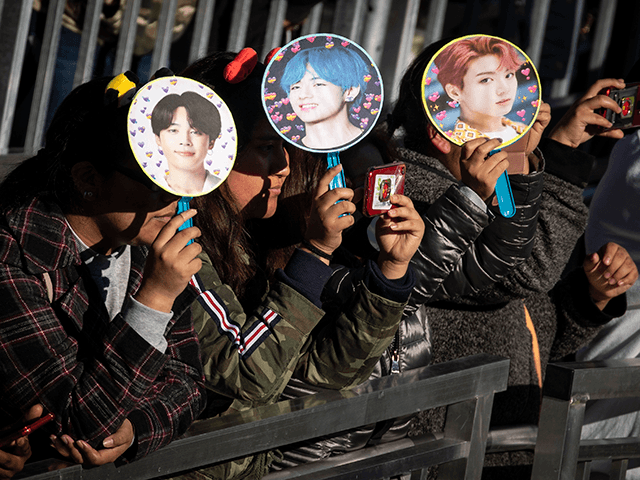The Chinese embassy in South Korea insisted Wednesday that Beijing’s crackdown on “fan culture” does not target any particular foreign country. South Korean media organizations have suggested the Chinese Communist Party (CCP) launched the crackdown because it was worried about the cultural influence of popular “K-pop” entertainers.
“China’s actions are aimed at all words and deeds that may impact public order, customs as well as laws and regulations, and will not affect normal exchanges between China and any country,” the Chinese embassy in Seoul said in a statement addressing the controversy.
The embassy expressed some incredulity that South Korean media are “worried about the impact of cultural exchanges between China and South Korea and even believe that China’s relevant measures are aimed at South Korea.”
The CCP issued a number of cultural edicts over the summer, including a regulatory crackdown on online videogames, which the Chinese government derided as “spiritual opium,” and a notorious directive to put fewer “sissy men” on Chinese television.
Another crackdown was aimed at “fan culture,” particularly obsessive devotion by young people to popular entertainers, which can reach manic heights in China. Young celebrity stalkers have become notorious in Chinese media over the past few years, drawing concern from the public and CCP officials because their obsessions left them unemployed or led them to engage in illegal behavior, such as planting an illegal electronic tracking device on a popular actor’s car, and publicly plotting to break a musician out of prison after he was charged with rape.
Chinese officials also castigated opportunistic corporations for cashing in on fan culture and exploiting children. In one instance, a TV show manipulated obsessed fans into buying huge quantities of yogurt by allowing only those who purchased the product to cast votes for the contestants.
Chinese agencies began speaking of fan culture as almost a terrorist threat, culminating in a 10-point program for tamping down “unhealthy” and “chaotic” fandom released by the Cyberspace Administration of China (CAC) in late August.
The Chinese government actually described its own plan to protect the “political and ideological security” of Chinese cyberspace as “heavy-fisted.” The plan targeted celebrities and entrepreneurs as well as fans, haranguing the entertainment industry for instilling “incorrect values” in young people.
The CAC’s “rectification” program included restrictions on social media groups and online activities thought to nourish extreme fandom, such as fan-driven polls to rank celebrities by popularity.
Many subjects of Chinese fan culture obsession are South Korean entertainers, notably including international boy band sensation BTS, which has effectively been deputized by the South Korean government as national cultural ambassadors. For the benefit of middle-aged American viewers puzzled by the sudden ubiquity of fashionably dressed young Korean men in U.S. television commercials: that’s BTS.
Korean stars are so popular in China that the Chinese have adopted a Korean term to describe toxic fandom: sasaeng, a phrase referring to the “private life” of celebrities that obsessive fans often violate.
On Sunday, Chinese social media platform Weibo surprisingly banned the fan club for Jimin, a member of BTS, from posting for 60 days. The fan club, which has over a million followers, was accused of exploiting fan culture to illegally raise funds for customizing an airplane with photos of Jimin to celebrate his birthday.
The First in the world—Customized Exclusive Airplane in cooperation with Jeju Air
Period: 9.1-11.30
Flight Number: HL8087Note: The route may be changed due to some special reasons, please download Flightradar24 to check the flight information. pic.twitter.com/vp6AMpqjgd
— PARKJIMINBAR👑 (@JIMINBAR_CHINA) September 1, 2021
“Weibo firmly opposes such irrational star-chasing behavior and will deal with it seriously,” the social media company said in a statement announcing the ban.
Weibo also issued 30-day bans for 21 other fan accounts for engaging in “irrational star-chasing.” Most of the banned accounts were devoted to K-pop acts, some of which have included Chinese singers in their lineups.
“The sudden clampdown on South Korean pop culture came after Chinese President Xi Jinping led a campaign to strengthen control over a range of sectors, including online gaming, private education and cultural content, including K-pop music,” the Korea Herald noted Wednesday.
“It was not the first time Chinese authorities put restrictions on the distribution of Korean content, but the latest move, given its scale and nature, appears worrying enough to prompt Korean media and brokerages to analyze the repercussions,” the Korea Herald added.
Most of those analysts concluded that while K-pop is popular in China, the Chinese market is not big enough to severely damage the South Korean music industry, which has diversified into markets around the world.

COMMENTS
Please let us know if you're having issues with commenting.